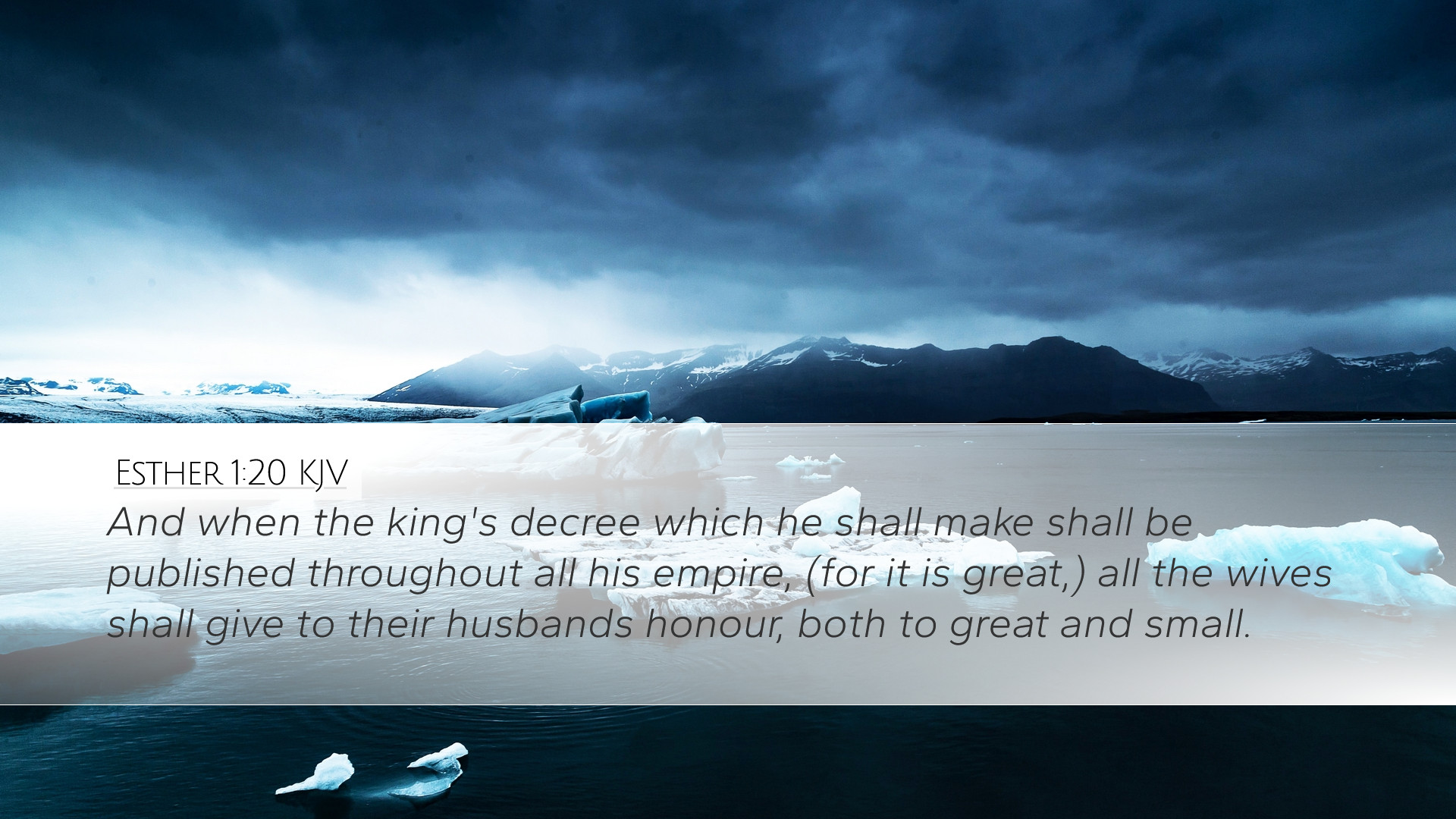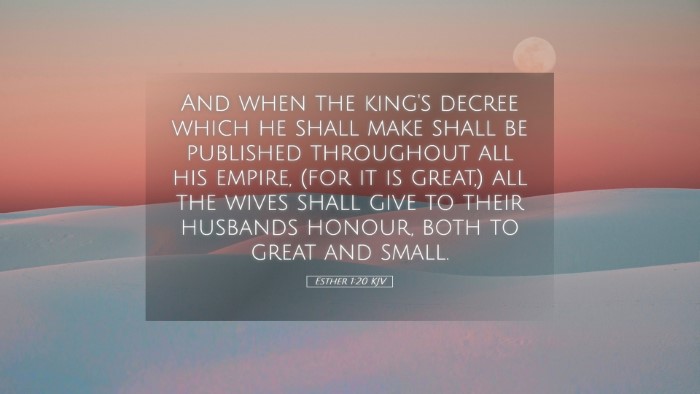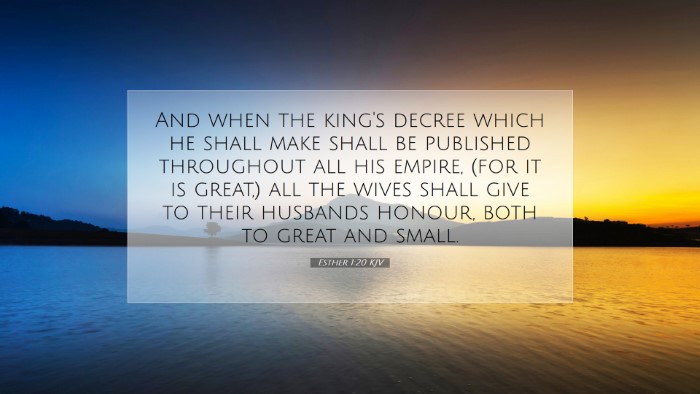Old Testament
Genesis Exodus Leviticus Numbers Deuteronomy Joshua Judges Ruth 1 Samuel 2 Samuel 1 Kings 2 Kings 1 Chronicles 2 Chronicles Ezra Nehemiah Esther Job Psalms Proverbs Ecclesiastes Song of Solomon Isaiah Jeremiah Lamentations Ezekiel Daniel Hosea Joel Amos Obadiah Jonah Micah Nahum Habakkuk Zephaniah Haggai Zechariah MalachiEsther 1:20
Esther 1:20 KJV
And when the king's decree which he shall make shall be published throughout all his empire, (for it is great,) all the wives shall give to their husbands honour, both to great and small.
Esther 1:20 Bible Commentary
Commentary on Esther 1:20
Esther 1:20 states: "And when the king's decree which he shall make shall be published throughout all his empire, (for it is great,) all the wives shall give to their husbands honour, both to great and small." This verse encapsulates a significant moment in the narrative of Esther, reflecting themes of authority, the dynamics of power, and the implications of decrees in the governance of society.
Contextual Background
The Book of Esther is set in the Persian Empire during a time when the Jewish people were in exile. This narrative unfolds against the backdrop of royal authority and the patriarchal society of the time, where the king's word was absolute and had far-reaching implications. The events leading up to this decree illustrate the king's desire to maintain order and to ensure that his rule was respected within his household.
Commentary Insights
Matthew Henry's Commentary
Matthew Henry emphasizes the cultural context of this verse, pointing out that the king’s decree was a method of reinforcing authority within the home. Henry notes that the issuance of the decree not only served as a means to quell rebellion within the royal court following Queen Vashti's refusal to obey, but it also intended to create an atmosphere where obedience to male authority was both normalized and codified. This act of declaring an edict reflects the broader societal values at play, particularly the emphasis on hierarchy and submission.
Henry further highlights the irony in the king's attempt to use a decree to manage domestic relationships. He suggests that while the decree may compel outward compliance, true honour and respect cannot be legislated. This observation invites readers to reflect on the nature of relationships, suggesting that mutual respect is more impactful than mere adherence to a royal command.
Albert Barnes' Notes
Albert Barnes interprets this verse as a significant statement on the social dynamics of the time. He indicates that the decree was not just an order but a cultural commentary intended for all levels of society—both "great and small." This universality underscores the king's intention to establish a long-lasting precedent regarding the treatment of women in the household.
Barnes also points out the importance of the decree's publication throughout the empire. He discusses how the act of broadcasting such a decree serves as a mechanism of control, reinforcing the role of the king as the ultimate authority in both public and private spheres. This, according to Barnes, reflects the broader patterns of governance in ancient empires where obedience to rule was vital for maintaining social order.
Adam Clarke's Commentary
Adam Clarke provides a critical analysis of the implications of this decree. He notes that it serves to reflect the king's attempt to restore his power and reinstate order following the upheaval caused by Queen Vashti's refusal. Clarke argues that this decree is emblematic of the flawed understanding of authority often seen throughout history, where force and edict are mistaken for respect and true leadership.
Clarke also raises concerns regarding the ethical implications of the decree, suggesting that while a king may seek to govern through mandates, it ultimately highlights the deficiencies in ruling through fear. The call for honour among husbands and wives indicates a patriarchal bias, yet it also opens a broader conversation about the nature of respect in relationships. He invites readers to contemplate how such relationships should ideally function based on love and respect rather than compulsion.
Theological Reflections
From a theological perspective, Esther 1:20 encourages deep reflection on the nature of authority and obedience in the Christian faith. The Scriptures often call for mutual submission and respect within relationships, challenging the notion that authority alone is sufficient for a harmonious existence.
The decree exemplified a tendency in humanity to seek control rather than to foster genuine relationships. This mirrors the theological themes of grace, forgiveness, and love found throughout the Bible, emphasizing that true leadership seeks transformation of the heart rather than mere compliance to rules.
Practical Applications for Church Leadership
For pastors and church leaders, Esther 1:20 serves as a reminder of the importance of leading with integrity and the heart of a servant. True leadership in the church should not mirror the coercive models of secular authority but rather reflect the character of Christ, who invited people to follow him through love and service.
- Encouraging Open Dialogue: Leaders should encourage discussions about authority and relationships within the church community, fostering an environment where all voices are valued.
- Modeling Respect: Leaders are called to model respectful relationships, both in their households and within the church, emphasizing that true honour is given freely rather than demanded.
- Promoting Equality: Recognizing the inherent dignity of all individuals, church leaders should strive to uphold equality within their congregations, valuing mutual submission as a reflection of Christ's love.
Conclusion
Esther 1:20 serves as a significant commentary on the interplay of authority, social customs, and human relationships. Engaging with this verse allows pastors, theologians, and students to reflect on the complexities of leadership and the ethical implications of authority. By integrating insights from classic commentaries, readers can draw meaningful applications for contemporary faith communities, steering discussions toward a more holistic understanding of respect and honour in the light of the Gospel.


